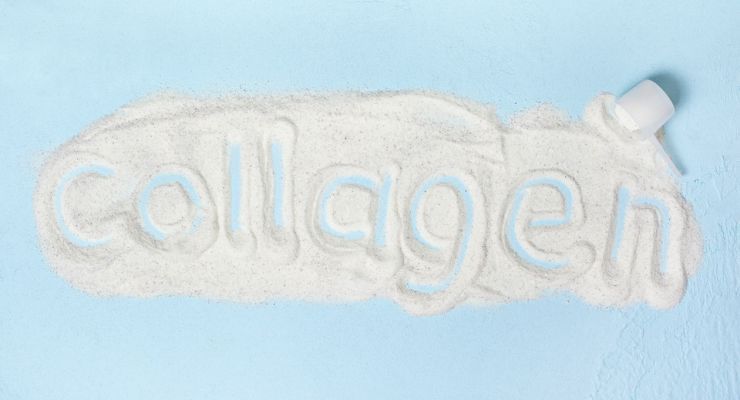Hydrolyzed collagen has taken the beauty and wellness world by storm, with many claiming that it improves everything from joint health to wrinkles. Most importantly, those claims are backed by studies. While there are several foods you can eat to increase your collagen intake, supplements are becoming increasingly popular. Since collagen production slows in your 30s, bumping up your levels via supplements could be a smart move. But what exactly is hydrolyzed collagen, and should you include it in your health and beauty regime?
Hydrolyzed collagen is easier to absorb
Collagen is the most abundant protein found in humans and animals. It makes up connective tissue, including bones, tendons, cartilage, organs, and skin. So, if you’re eating animal protein, you’re probably getting collagen in your diet. In fact, your body can’t really tell whether you’ve just eaten a piece of chicken, steak, beans, or a hydrolyzed collagen supplement — they’re all sources of protein. Once digested, they’re broken down into amino acids, and become indistinguishable. But foods you probably rarely, if ever eat, like the tendons, offer the most collagen. When collagen is hydrolyzed, it simply means it’s broken down into smaller, easier to absorb units. So, when you take hydrolyzed collagen, you’re boosting yourself with collagen-rich amino acids and making them more readily available for your tissues.
May replace ibuprofen and NSAIDs
Since the early 1990s, studies have linked taking collagen with diminished symptoms of arthritis. A study published in 2009 in the International Journal of Medical Sciences reported that supplementing with a 40 mg dose of collagen lowered arthritis pain by 26 percent in osteoarthritis sufferers. Additionally, supplementing with collagen can help ease pain and inflammation similar to ibuprofen or nonsteroidal anti-inflammatory drugs (NSAIDs), but without the harmful effects these drugs play on the body. Another controlled study found that a dose of collagen — as little as one to two grams per day — given to both human and rodent models for pain and repair, provided significant relief in joint pain and joint deterioration. So, if you’re looking for pain relief from arthritis and are worried about the long-term effect that ibuprofen and NSAIDs may have on your health, then perhaps you should consider taking hydrolyzed collagen.
Who benefits from taking hydrolyzed collagen?
Even if you do everything right, studies suggest that collagen supply diminishes naturally as we age — somewhere around your 30s. And of course, certain lifestyle factors like sun bathing, too much processed and fast foods, binging on alcohol, and poor sleep habits may even deplete collagen faster than normal. With this in mind, there are certain people who would benefit from boosting their collagen. Signs you may need hydrolyzed collagen include:
Stiff and achy joints — Since joint cartilage contains collagen, and joint pain is often the result of cartilage loss, it’s thought that supplementing with collagen can help reduce joint pain. Studies show that hydrolyzed collagen can even help strengthen joints and help ease the pain associated with osteoarthritis. In fact, another study published in the journal Nutrients, showed that postmenopausal women treated with five grams of collagen peptides per day, for one year, significantly increased bone mineral density and bone formation and reduced bone loss.
Wrinkled and loose skin — Your skin is made up of collagen, so supplementing with it may help tighten wrinkled and loose skin. A study that included 64 participants found that supplementing with one gram of collagen for 12 weeks significantly improved elasticity, wrinkling, and hydration in human skin. In fact, even the Food and Drug Administration (FDA) has come around to recognizing the benefits of injectable collagen to correct moderate to deep facial wrinkles and folds.
Boost muscle mass — Up to 10 percent of muscle tissue is made of collagen. A study published in The British Journal of Nutrition suggests that supplementing with collagen may help boost muscle mass in people with sarcopenia — muscle loss that happens naturally with age. The study looked at 27 frail men who supplemented with 15 grams of collagen for 12 weeks while exercising. Compared to those men who did not supplement with collagen — but still exercised — they gained significantly more muscle and strength.
Promotes heart health — Collagen gives arteries structure. Meaning, without it, the arteries would be fragile and weak and could not carry blood from the heart to the rest of the body. The result is the narrowing of the arteries, which can lead to heart attack and stroke. A study published in the Journal of Atherosclerosis and Thrombosis, had 31 healthy adults take 16 grams of collagen daily for six months. The study showed a significant reduction in artery stiffness and a six percent increase in levels of HDL “good” cholesterol.
Brittle hair and nails — Clinical trials show that supplementing with collagen may increase the strength of your hair and nails by preventing breakage and brittleness. Additionally, it may also stimulate nail and hair growth.
In addition, if you generally eat little to no meat and poultry, then you might want to boost your collagen levels for pain management and tighter skin. However, if you are a vegetarian or vegan, make sure to look for supplements labeled as “plant-based,” which have the same amino-acids as collagen derived from animal sources.
Keep in mind, hydrolyzed collagen is not a miracle cure. Simply taking it won’t fix all the wrongs you’re currently doing to your body, like habitually pulling all-nighters and binging on pizza and alcohol. Taking it doesn’t magically compensate for daily lifestyle choices that are less than healthy. So, for best results, try to maintain a healthy lifestyle even when supplementing with it.
-Susan Patterson

